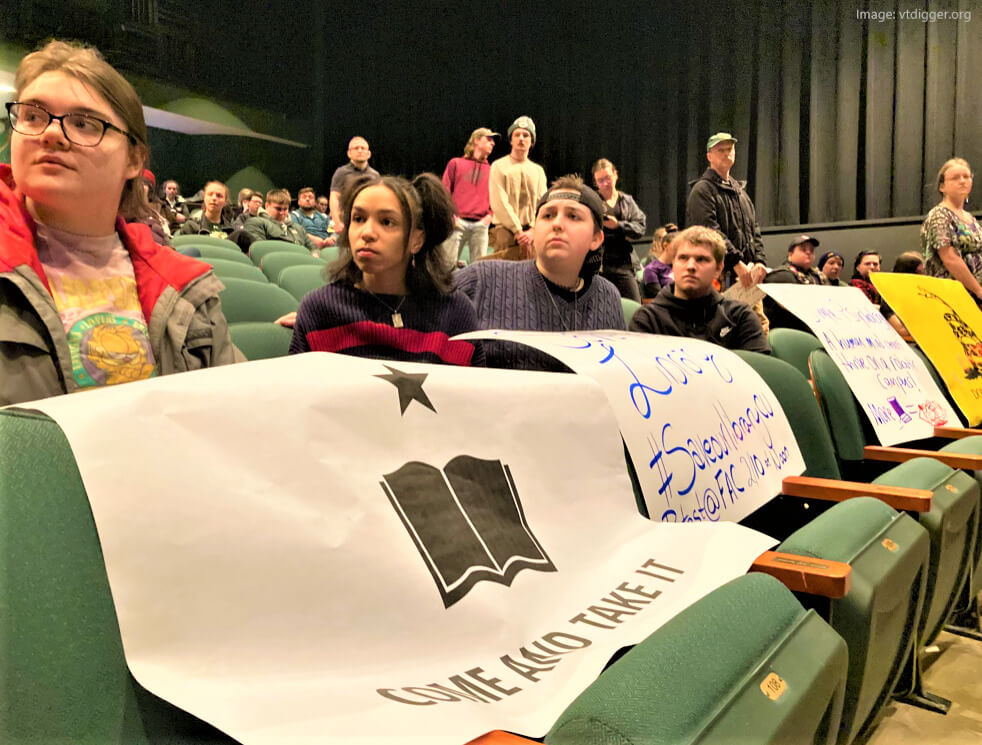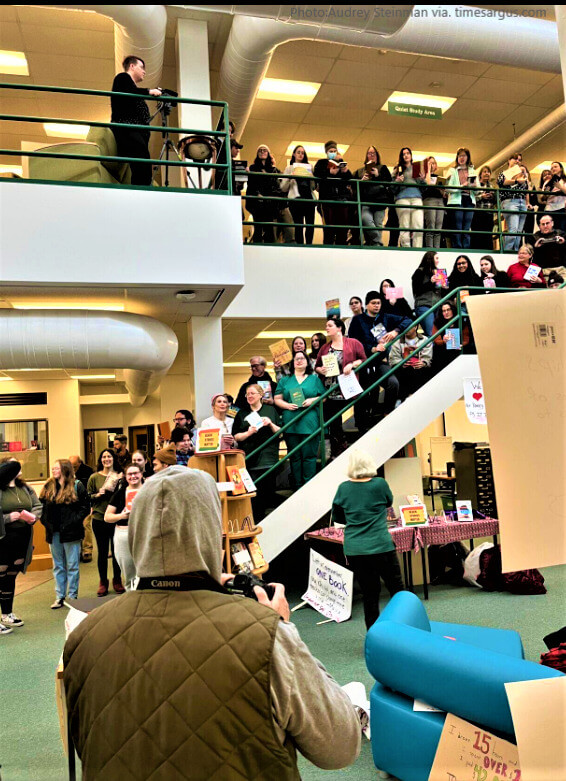

Castleton University, Northern Vermont University, and Vermont Technical College are currently in the process of consolidating into one academic community which will be called “Vermont State University”. As part of this transition, administrators announced on February 7th that it would be making massive changes to the university’s programs, by cutting sports and closing all physical libraries to create an all-digital library system. Upcoming University president, Parwinder Grewal stated that the aim “is to strengthen and expand access to our athletics offerings and provide greater equity of access to our library services.”
This surprise news was not well received by many students, community members and alumni. On Feb 10th, there was a protest at a forum when scores of students and community members crowed the Castleton University’s Fine Arts Center with posters and banners. Many students got the chance to speak and share their concerns with the administration.


As reported by vtdigger.org, some students expressed they are fed up with online learning, and that there is a real benefit to having access to a physical books as well as digital materials. A 2014 study found that readers who used print books for studying, were able to absorb and recall that data better than those who only learned through information that was only provided in a digital form. And a 2020 study showed that there is much more to reading than merely viewing the content. “In fact, like any other object, the experience of interacting with a book, especially an old or historic volume, offers the reader the potential for a multisensory encounter.” Memory is directly linked to sensory input, in particular smells and touch.
Another point of contention, shared from a second-year student who spoke at the meeting, was that the change to an all-digital library creates barriers for people with disabilities. “Many students, including myself, who have disabilities are not able to read online because of the glare from the computer.” Another student added, “It can cause medical problems. And so by getting rid of books, you are blatantly adding to students’ failures.” A November 2022 study published in Seizure European Journal of Epilepsy showed that too much exposure to computer screens can cause “electronic stress”, which can cause seizures for people with epilepsy.
Many of the speakers questioned whether this move to reduce sports and eliminate libraries was in the students’ best interest at all. There are multiple studies which look at the relationship and affect that screen time, especially in the evening, has on sleep, physcial health, ADHD and mental health. It’s common knowledge that screen time before bed should be avoided, and yet most students lead very busy lives which prevent this. Between full class schedules, extracurricular actives, and after school jobs, for many students the only time they have to do homework is in the evenings.
After students and community members expressed their concerns, Kelley Beckwith, Vermont State University’s vice president of student success said, “We are all sorry for how this was communicated.” The school’s statement included recognition that some programs rely on physical resources and that the school was committed to identify those resources and explore mechanisms for their maintenance whether with the program or in other venues. Beckwith continued, “We’re not taking all the books out of the library. You’re going to have the academic materials that you need related to your academic programs.”
According to the administration the decision to downsize was based on a recent student survey. However, VTDigger reported that the amount of respondents to that survey were only 500 students. Since the student population is over 5,500, the survey only represents 10% of the population. It’s also unclear if all three of the merging campuses were surveyed.
Students pushed back at this reasoning, stating that many did not receive the emailed survey, while others said that the critical nature of the survey was not been properly conveyed. “We get hundreds of emails a day,” said Haley Agan, a second-year history major “We don’t have time to read them all. And if we did open it, it definitely was not titled, ‘You need to take this survey to save your library.’”
“I feel like we’re losing the heart of our community when we lose our library.”


The Backlash has escalated
As reported by Time Argus on February 23rd, a petition with 400 signatures from Castleton University’s alumni stated, “There has been a lack of leadership at the highest levels as well as a lack of transparency in decision-making, and as a result, there is a severe lack of trust. The latest misguided effort has been the announcement that all VSCS libraries, including the Calvin Coolidge Library, will transition to a primarily digital model, eliminating much of the physical collection, as well as the jobs of the people who provide the support in maintaining those collections.” The campuses’ libraries are planning to donate most of their books and the spaces will be refitted for other purposes. The move will terminate seven full-time jobs, three part-time jobs, and student placement work.
The heated issue has reached Lieutenant Governor David Zuckerman. In a press statement released on February 21st, Zuckerman said, “Today, I met with dozens of students, faculty and staff from across the VSC system who have been impacted by the planned library closures and changes to the athletics programs. I am concerned by the lack of input that the administration has sought from those who will be most impacted by these decisions. It appears that many of these cuts will create a larger economic decline than the purported savings. If these cuts lead to a large exodus of students and faculty, it could be terminal for those institutions which we cherish across the state. Vermont is on the precipice of significant in-migration. We should be working to attract more students to our state colleges, not making cuts that will likely result in reduced enrollment. I look forward to reaching out to the VSC administration to gain a better understanding of their research into the ramifications of these cuts.”
An avid book reader and proud library card holder, Angela is new to the world of e-Readers. She has a background in education, emergency response, fitness, loves to be in nature, traveling and exploring. With an honours science degree in anthropology, Angela also studied writing after graduation. She has contributed work to The London Free Press, The Gazette, The Londoner, Best Version Media, Lifeliner, and Citymedia.ca.
